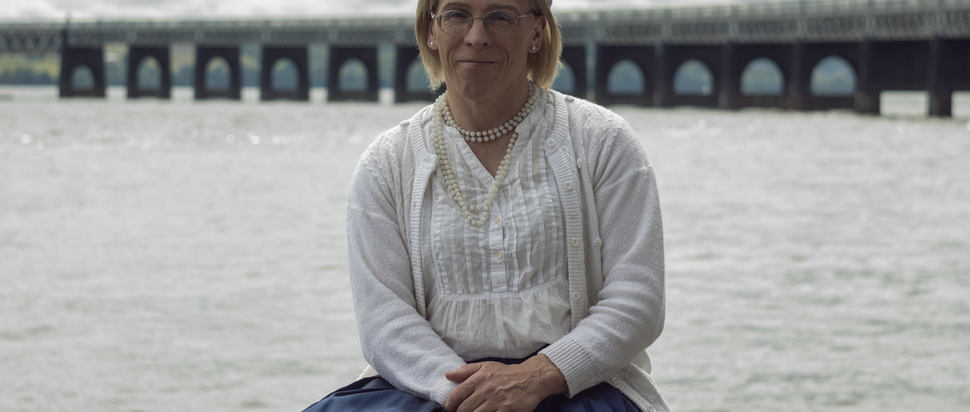The Open road: The path to life long learning
We talk to Sophie Grace Chappell, Professor of Philosophy at the Open University, about epiphanies, Bruce Springsteen, and making the most of human potential
“There is nothing more wasteful of human potential than engrained hierarchies” – this is the doctrine of the Open University’s Sophie Grace Chappell. A Professor of Philosophy, Chappell works most regularly on the topic of ethics, and is the only trans woman to hold a Philosophy Chair in the UK. Her work at the OU, she says, aims at undermining the hierarchy that is so deeply ingrained in UK society. It has, after all, been nicknamed by some 'the university of the second chance'.
“Human beings are always full of potential, always capable of surprising you, of doing something new and amazing and creative. And we need to find ways of structuring society to realise that potential in as many people as we can,” says Chappell.
The Open University prides itself on giving anyone, anywhere, the chance to learn. Chappell says this is reflected in the student demographic – from her home in Dundee where she lives with her family, she is able to reach a wide variety of students.
“Alongside 18-year-olds we have people in prison, we have people aboard submarines, we have hermits on Hebridean islands. We also have retired Whitehall mandarins and 75-year-old ex-Classics teachers; you can’t ever take it for granted, when you teach for the OU, that you’re not talking to a student who actually knows more about the topic of your lecture than you do yourself!”
Philosophy is a subject area that is often seen from the outside as somewhat impenetrable – woe betide the unlucky first year who picks it up as an 'easy' outside module. But Chappell points out that philosophy is much bigger than its academic study – it’s something that most of us engage with on a daily basis.
“When you ask whether anyone really knows anything, or what the difference is between a good argument and a bad argument [...] or whether other people have the same experience as you when they see something yellow – and what you mean here by 'the same', or 'experience', or indeed 'yellow' – when you engage with any of these questions you’re doing philosophy. All an academic can do is help you to think about questions like these in a clearer and more organised way.”
She’s recently finished writing a book on epiphanies, and weighs their importance in our lives against the value of the times when they are markedly absent. “I’m interested in how [the highs and lows of our psyches] interact, and in how the bad times feed and nourish and make possible the good times.” Originally a religious term, the 'epiphany' attained its contemporary meaning through the writing of James Joyce, who used it as a literary device in Stephen Hero and Dubliners. On whether any living artists seem to have taken up this mantle, Chappell points out that art is all about moments where something suddenly strikes you as overwhelmingly beautiful.
“Given that I’m 56, I won’t embarrass myself, and you, by trying to talk – in a student magazine! – about the latest things in music, or in film for that matter. But the best Bob Dylan and Springsteen is epiphanic. Bruce’s Backstreets is an epiphany [...] it’s about turning private, personal pain into public, universal beauty, which is one of the big important things that a lot of art does for us.”
It’s obvious that art has always been central to her life, although it may have taken some time to work out just in what capacity. “When I was 18 I wanted to be really, really good at something. I wasn’t quite sure what.
"It took me longer than it might have done to work out that what I’m best at is philosophy, with a side-order of poetry. Maybe longer than it should have done, but hey, life is the journey. If we knew in advance where we were going to end up, we could just head straight there without the detours and false starts. In that case life would be a whole lot simpler, for sure. But on the other hand, it wouldn’t really be life.”
This sentiment undoubtedly rings true for those who spend their young years feeling lost, or who commit to one course only to find that it feels entirely wrong. Chappell says that two quotations sum up the lessons she would impart to those who feel directionless. “One is my favourite line from my favourite film, Moulin Rouge!: 'The greatest thing you’ll ever learn is just to love and be loved in return.' The other is a quotation from D.H. Lawrence: 'Find your deepest impulse, and follow that.'”
Sophie Grace Chappell’s books include Ethics and Experience (Acumen 2009) and Knowing What to Do (OUP 2015). Her next philosophy book Epiphanies is forthcoming in 2022 (OUP), as is a collection of her poems, Songs for Winter Rain (Ellipsis Imprints)
